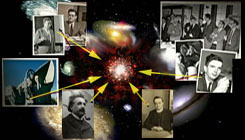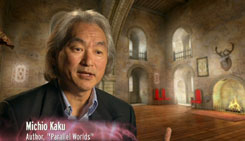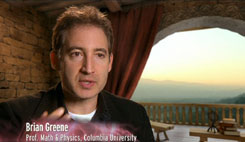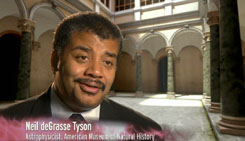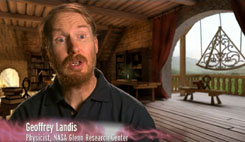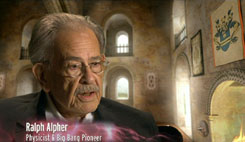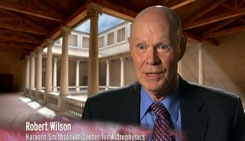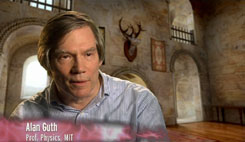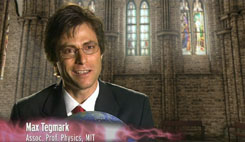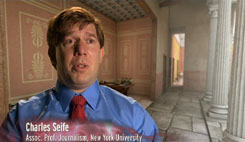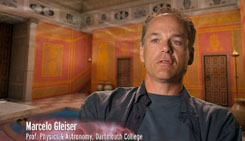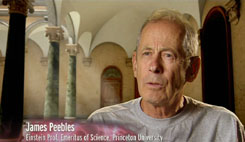It's a very bizarre thing for any television series to temporarily
and suddenly have a big episode produced by an entirely different production company.
But that's what we get here. We've got a different narrator, a different musician,
and a whole new set of writing/directing producers. The whole thing strikes a markedly
different tone, noticeably more serene and laid-back. It could easily be mistaken
for an entirely different show, if not for a final bit of the title sequence
squeezing in like a post-production after-thought, with an edited and held-back
snippet of the title music.
The first half of this double-length documentary seems to want to cover
most of the same early-history-of-science-and-astronomy territory as
Carl Sagan's entire series "Cosmos",
even though it doesn't have the screen time to go into as much depth.
Undaunted, it treats us to a cornucopia of interviewees.
I'm really not sure why there are so many of them,
or why they ALL happen to be men - and mostly elderly white males at that.
The few exceptions (Kaku, Tyson, Tegmark, etc.) really stand out from the crowd
in that respect.
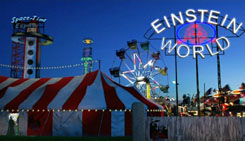 Right near the middle, we have reached Einstein's time, and we begin to
get a bit about his theories. It's not very deeply or profoundly investigated here.
Strangely, his concepts are likened to an amusement park of wild rides,
with a showman "marketing" Einstein's brain structure like a sideshow curiosity.
Are we deliberately meant to distrust this character's information?
Right near the middle, we have reached Einstein's time, and we begin to
get a bit about his theories. It's not very deeply or profoundly investigated here.
Strangely, his concepts are likened to an amusement park of wild rides,
with a showman "marketing" Einstein's brain structure like a sideshow curiosity.
Are we deliberately meant to distrust this character's information?
It's the post-Einstein bits in the second half that truly allow this documentary
to contribute uniquely to a continuing series that explores science and astronomy regularly.
We get a comprehensive view of the various people and theories and data that gradually
stacked up until humanity felt sure that the big bang actually happened when it did,
and what this meant for other scientific, philosophical, and religious explorations.
What's more, a lot of the figures who were key to this "eureka" moment in history
and the theory's further development are here being interviewed for the show,
including Ralph Alpher, Robert Wilson, and Alan Guth. Alpher in particular knew
a lot of the other figures, and can give first-hand insight into how their personalities
helped shape events. Very good stuff this is, and unlikely to be repeated in quite
so much detail anywhere else.
Charles Seife:
"The idea that you can predict something doesn't mean
you understand the fundamental principles behind it."
Max Tegmark:
"Right now, `Dark Energy' is mostly a code word
for our ignorance of what the substance is.
Some people think it's some sort of stuff.
Some people think it's a constant that should be
in Einstein's equation.
Some people think it's just a reflection of the fact
that we might have gotten our gravity wrong... again."
Even though Max Tegmark is the last of the interviewees to be introduced,
his interview is one of the better ones, and
he ends up giving me my favourite quote of the episode.
I tend to fall into the latter camp he describes,
wondering if the mathematical need to have a dark something
fill in the holes in the equations means that the theory of gravity
or whatever has taken a wrong turn and hit a dead end.
Though I like this episode and feel it is a good one,
it's ultimately not in contention to be one of my favourites of "The Universe".
I tend to prefer the ones exploring planets and moons both in our solar system
and beyond, offering less speculative theory and inadequately explained reasoning.
Chapter Breakdown:
- Introduction
- Begin with a Bang
- Ancient Observations
- Sun at the Center
- Dogma and Science Collide
- Power of Mathematics
- Einstein's Theory
- Expanding Universe
- Steady State Theory
- The Smoking Gun
- Inflation Theory
- Imagine the Future
|
Participants include:
|

